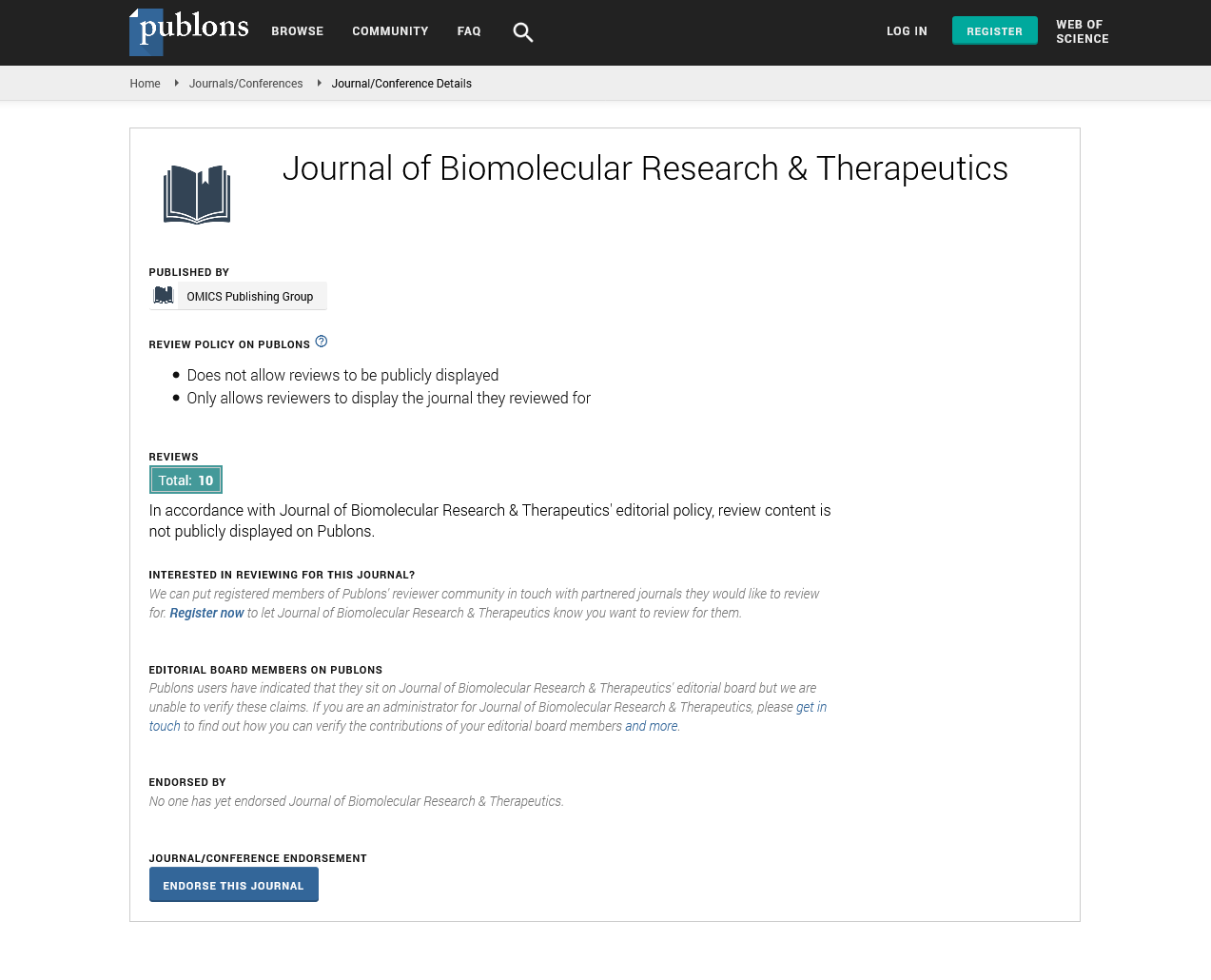Indexed In
- Open J Gate
- Genamics JournalSeek
- ResearchBible
- Electronic Journals Library
- RefSeek
- Hamdard University
- EBSCO A-Z
- OCLC- WorldCat
- SWB online catalog
- Virtual Library of Biology (vifabio)
- Publons
- Euro Pub
- Google Scholar
Useful Links
Share This Page
Journal Flyer

Open Access Journals
- Agri and Aquaculture
- Biochemistry
- Bioinformatics & Systems Biology
- Business & Management
- Chemistry
- Clinical Sciences
- Engineering
- Food & Nutrition
- General Science
- Genetics & Molecular Biology
- Immunology & Microbiology
- Medical Sciences
- Neuroscience & Psychology
- Nursing & Health Care
- Pharmaceutical Sciences
Commentary - (2024) Volume 13, Issue 4
Biomolecular Engineering: Using the Technology to Enhance Biological Strategies
Amelia Shorewood*Received: 29-Jul-2024, Manuscript No. BOM-24-26740; Editor assigned: 01-Aug-2024, Pre QC No. BOM-24-26740 (PQ); Reviewed: 15-Aug-2024, QC No. BOM-24-26740; Revised: 22-Aug-2024, Manuscript No. BOM-24-26740 (R); Published: 30-Aug-2024, DOI: 10.35248/2167-7956.24.13.403
Description
Biomolecular engineering, a dynamic field at the crossroads of biology and technology, is reshaping how we approach scientific challenges. By using the principles of molecular biology, chemistry, and engineering, this discipline creates innovative solutions for diverse applications. From healthcare to environmental sustainability, biomolecular engineering is another method for next-generation technologies that mechanisms to transform our world.
Understanding biomolecular engineering
Biomolecular engineering involves the manipulation and design of biological molecules to develop new technologies and processes. It integrates techniques from molecular biology, genetic engineering, and synthetic biology to construct molecules, systems, and devices with customized functions. This interdisciplinary approach enables scientists to address complex problems that were previously intractable.
Innovations of biomolecular engineering
Synthetic biology is a fundamental of biomolecular engineering, focusing on the design and construction of new biological parts and systems. By creating standardized genetic components, synthetic biology allows for the modular assembly of complex biological systems. This approach has led to the development of biosensors, biofuels, and synthetic organisms with customized functions. The ability to engineer life at the molecular level opens up new possibilities for biomanufacturing and environmental sustainability.
Protein engineering and therapeutic development: Protein engineering involves the design and modification of proteins to achieve desired properties and functions. Techniques such as directed evolution mimic natural selection to evolve proteins with enhanced characteristics. Engineered proteins have found applications in medicine, industry, and research. For example, monoclonal antibodies, engineered through protein engineering, are used in cancer therapy and autoimmune disease treatment. These advancements highlight the role of biomolecular engineering in creating next-generation therapeutics.
Nanobiotechnology and targets: Nanobiotechnology merges nanotechnology with biomolecular engineering to create nanoscale materials and devices with biological functionalities. Innovations in this field include nanoparticles for targeted drug delivery, nanosensors for disease detection, and nanostructured materials for tissue engineering. Nanobiotechnology enables precision medicine by delivering therapies directly to diseased cells, minimizing side effects and enhancing treatment efficacy.
Applications of biomolecular engineering
Biomolecular engineering is revolutionizing healthcare by enabling personalized medicine and advanced therapies. Genome editing technologies, such as Clustered Regularly Interspaced Short Palindromic Repeats (CRISPR)-Cas9, influence the capacity for treating genetic disorders by correcting mutations at their source. Additionally, biomolecular diagnostics allow for the early detection of diseases, leading to more effective treatments. Personalized medicine, guided by an individual’s genetic profile, is becoming a reality, customized treatments that maximize efficacy and minimize adverse effects.
Sustainable agriculture: In agriculture, biomolecular engineering is driving the development of genetically modified crops with improved traits. These crops are designed to resist pests, tolerate environmental stresses, and enhance nutritional content. By reducing the reliance on chemical pesticides and increasing crop yields, Genetically Modified Organisms (GMOs) contribute to sustainable farming practices. Furthermore, engineered microorganisms are used to improve soil health and promote plant growth, further enhancing agricultural sustainability.
Biomanufacturing and industrial biotechnology: Biomanufacturing harnesses biomolecular engineering to produce valuable chemicals, biofuels, and pharmaceuticals. Engineered microorganisms and enzymes are used to catalyze industrial processes, making them more efficient and environmentally friendly. For instance, bio- based production of chemicals reduces the reliance on fossil fuels and lowers greenhouse gas emissions. Biomolecular engineering thus supports the transition to a bio-based economy, promoting sustainability and resource efficiency.
Conclusion
Biomolecular engineering, by the biology and technology, is driving the development of next-generation solutions across various fields. Innovations in genome editing, synthetic biology, protein engineering, and nanobiotechnology are transforming healthcare, agriculture, environmental science, and industrial biotechnology. As the field continues to evolve, the significant for biomolecular engineering to address global challenges and improve quality of life becomes increasingly evident. Through interdisciplinary collaboration and technological advancements, biomolecular engineering is poised to shape sustainable and healthier perspectives.
Citation: Shorewood A (2024). Biomolecular Engineering: Using the Technology to Enhance Biological Strategies. J Biomol Res Ther. 13:403.
Copyright: © 2024 Shorewood A. This is an open-access article distributed under the terms of the Creative Commons Attribution License, which permits unrestricted use, distribution, and reproduction in any medium, provided the original author and source are credited.

